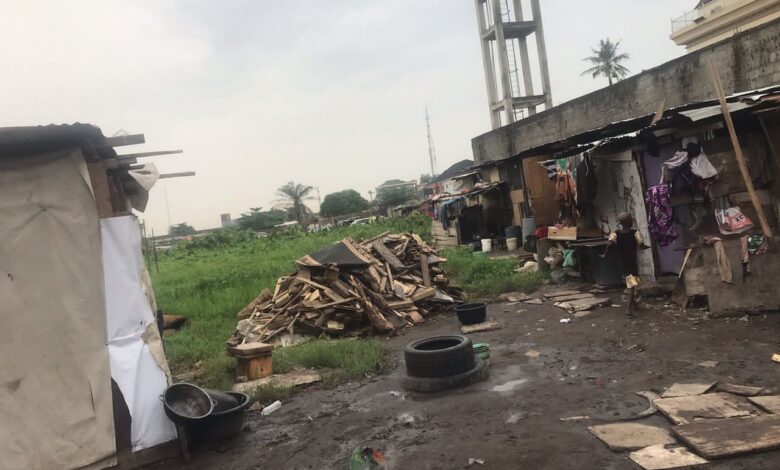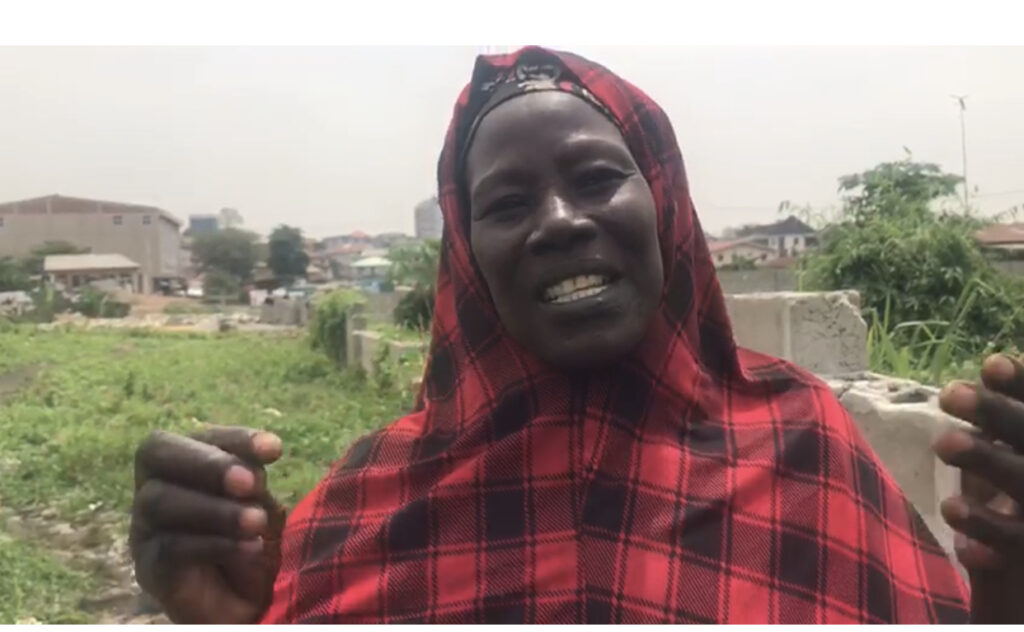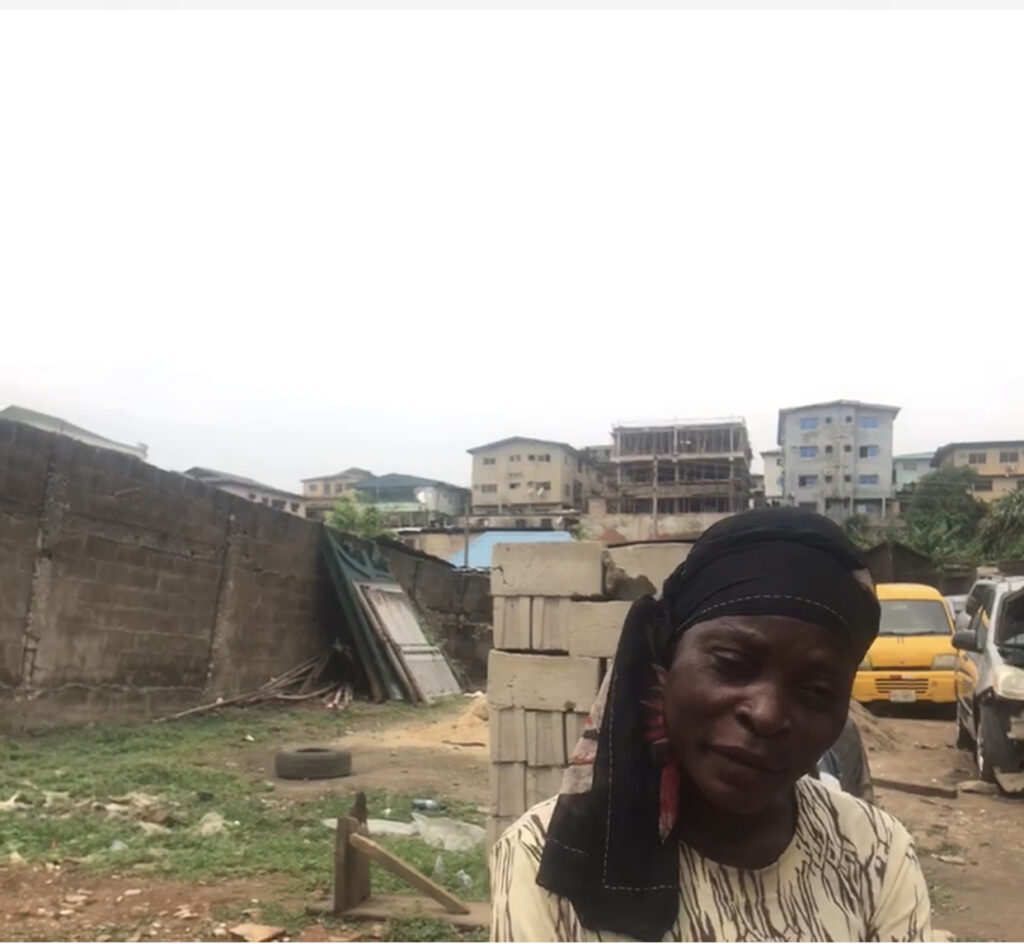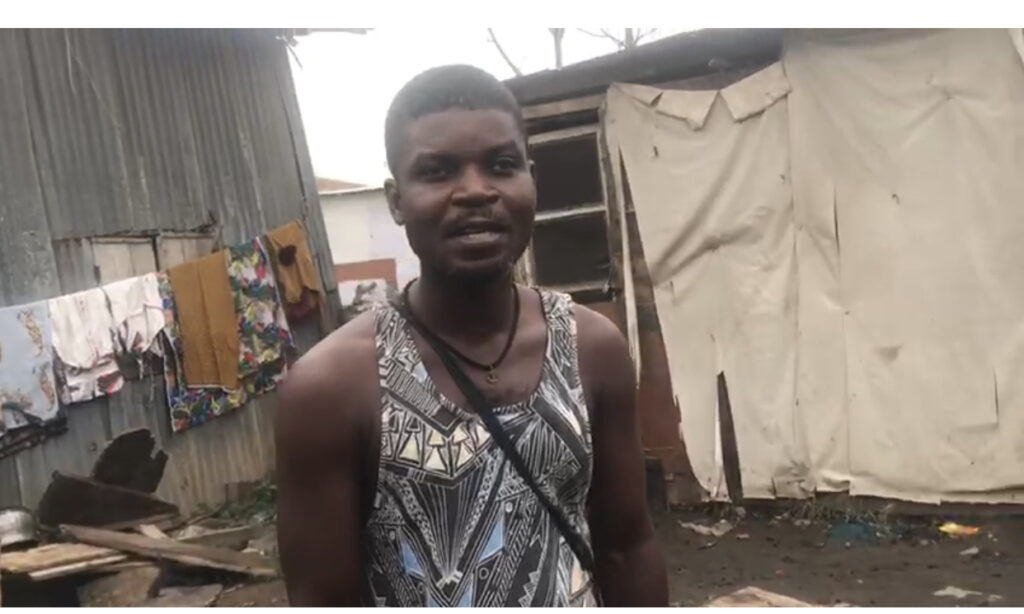Displaced And Neglected (2): “How We Ended Up In Lagos Monkey Village”
Forced to leave a place they have called home for a while, Monkey Village's widows talk about their journey to the now-demolished slum in Lagos, Southwest Nigeria.

Ten years ago, shortly after her husband’s death, Sola Joseph, 49, popularly referred to as ‘Iya Sango’, left Ipokia in Ogun State to Lagos, Southwest Nigeria, with her children.
Picking cartons while walking through the mechanic village at Odeniran Close in Lagos, she tells HumAngle: “I have been staying in Monkey Village for a long time, and I was able to cater for my children until we were forcefully evicted. I lost almost everything I have laboured for.”
Iya Sango cannot afford to rent a house in Lagos. She passes through a lot; from being beaten in the rain to sleeping in the open. “A single room goes for N300,000 to N400,000,” she explains.
Today, she scavenges for cartons and sells them for a living. “I sell a kilo for N30 if it has weight. I keep these cartons so I could get up to five to 10 kilos and feed my children. Being a widow is challenging because you have to struggle to make ends meet. Imagine struggling all these years and one day the government destroyed it.”
Many of those evicted from the ‘slum’ are seeking refuge in different places, she points out. Yet, a few return to the community in search of sources of livelihood.
Life is hard without their husbands
For over 16 years of marriage, Emite Jida, popularly called Mama Gamboya, could always count on her husband who never left his family for a long period of time. Although she ran a tea business, she never contemplated life as the breadwinner.
Jida provided for his family by working as a security guard. “He dedicated his life to the happiness of his wife and children,” Emite says.
Emite’s husband died of a heart disease nine years ago. That event became the worst experience in her life as reality set in. She has taken care of her four children since by selling tea.
When the eviction and government demolition of Monkey Village in March 2021 happened, Emite’s life took a different turn. They lost money, clothing, and other valuables.
“I have been asked to leave where I sell tea but I appealed to them to allow me stay till my children finish Primary School. But I will look for another location and raise another shack after Ramadan fast,” she says.

Widowhood in Nigeria
In the Nigerian society, widowhood is a dreadful experience for many. Although this differs from one culture to the other, widows are most likely to face challenges following the death of their husbands.
Women are subject to tyranny and exploitation by in-laws, clans, village chiefs, or villagers due to their lack of economic freedom and incapacity to fend for themselves. These people often hide behind customs and traditions to subject women to unwholesome behaviors such as seeking the late husband’s properties and, in most cases, selling some to raise pay for the deceased’s burial.
Among the Yorubas, a widow is thought to be the property of her deceased husband and hence cannot inherit his property. Only children, brothers, and uncles are eligible to inherit the property of a deceased individual.
Although the nation’s customary law stipulates the deceased husband’s family is responsible for his wife and children, this has become a role for friends, with a few of them taking up the responsibility of the children’s education. But this is, sometimes, only for a short time.
A bill to amend the the Violence Against Persons (Prohibition) Act scaled second reading at the House of Representatives in Feb. 2022.
It aims to prohibit all sorts of repressive and demeaning widowhood practices, as well as offer victims with remedies and hold violators accountable.
The bill comes after a public uproar, primarily from widows who have been subjected to harsh treatment by extended family members following the death of their husbands.
Many widows in Nigeria’s many cultures are forced to give up their late husband’s property, custody of their children, and marriage to one of the late husband’s siblings, among other things.
These are some of the practices that, if passed, the bill will seek to punish.

Running away
Folashade Onikoyi, 40, describes her leaving Kwara State in North-central Nigeria as “running away” due to family issues when she lost her husband in 2011.
“I came to the demolished Monkey Village eight years ago with my children to make ends meet. Before the demolition, I was able to feed my children, send them to school, and save some amount of money because I was making enough sales from grinding pepper, beans and other edibles,” she says, teary-eyed.
Currently, Folashade puts up with Fatema Dawud, another victim. “I have sent my children to live with my mum while I continue hustling. I don’t make up to N1000 [$2] daily.”
Fatema Dawud is one of the women that was evicted from Monkey village. HumAngle reported how Fatema’s life took a different turn since Monkey Village was demolished without warning.
“What can we do? the government did not give us prior notice. Everything vanished, life is not fair to us at all.”
Cry for government assistance
Mensah Dew, a leader in the community, appealed to the government to relocate the community to a better place where children can have access to basic education.
He says the demolishment has rendered a lot of people in the community jobless.
“People left after the demolition and it’s been so difficult to feed ourselves and the children. The children are no longer going to school and we live in swamps, close to the frogs.”

“When the government is involved, there is nothing we can do and they have not stopped demolishing,” Dew adds.
The Lagos State government bulldozed structures in Monkey Village, displacing over 1,000 inhabitants who had lived in the slum for years. Presently, the area is covered with weeds.
While no lives were lost, people were injured and property worth millions of naira, as well as projects run by a Non-governmental Organisation (NGO), were destroyed.
The Lagos State Task Force on Environmental and Special Offences (Enforcement) Unit, in a statement, denied any involvement.
However, in a contradictory statement later, the ministry accepted responsibility for the demolition. It said, the “reclamation of the wetland” was the reason for the residents’ eviction.
All efforts to get a reaction from the government were unsuccessful as the spokesperson of the Lagos State Environmental and Special Offences Unit, Kehinde Adebayo, did not respond to the text and phone calls put across to him.
Support Our Journalism
There are millions of ordinary people affected by conflict in Africa whose stories are missing in the mainstream media. HumAngle is determined to tell those challenging and under-reported stories, hoping that the people impacted by these conflicts will find the safety and security they deserve.
To ensure that we continue to provide public service coverage, we have a small favour to ask you. We want you to be part of our journalistic endeavour by contributing a token to us.
Your donation will further promote a robust, free, and independent media.
Donate HereStay Closer To The Stories That Matter




